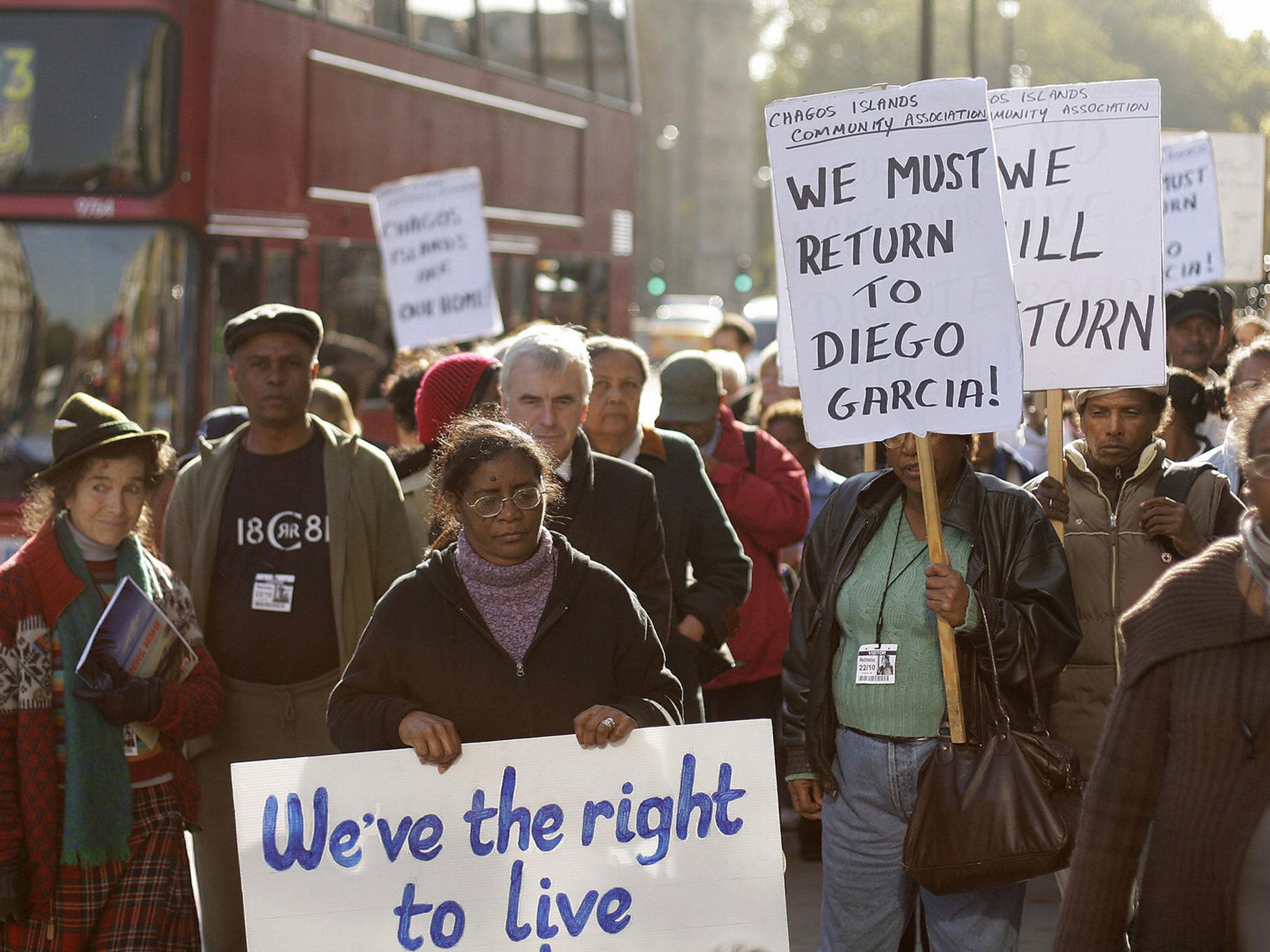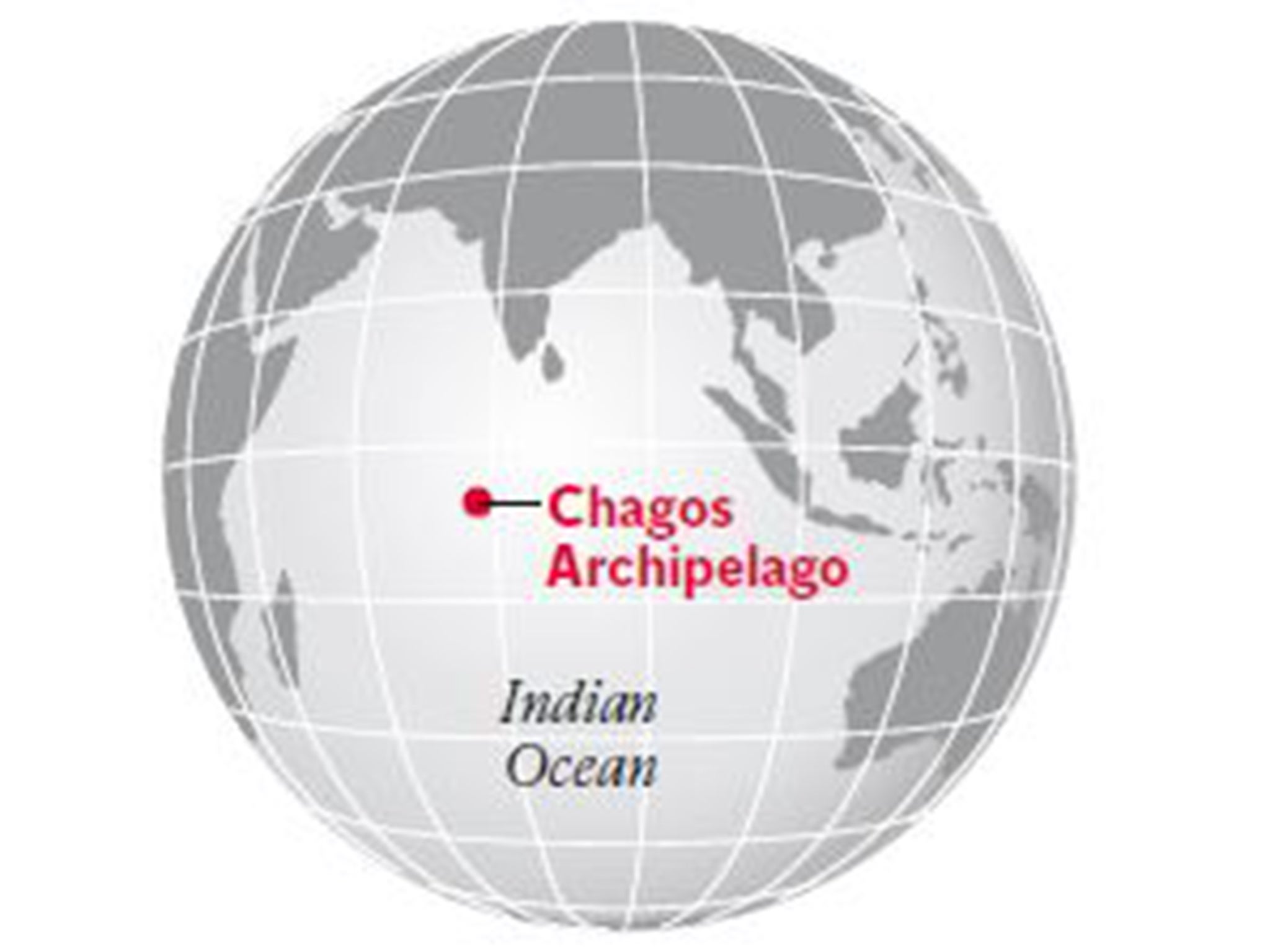Chagos islanders tell Britain they want to resettle their former home
About 1,500 Chagossians were removed by Britain in 1971 to make way for a new US military base on Diego Garcia

Your support helps us to tell the story
From reproductive rights to climate change to Big Tech, The Independent is on the ground when the story is developing. Whether it's investigating the financials of Elon Musk's pro-Trump PAC or producing our latest documentary, 'The A Word', which shines a light on the American women fighting for reproductive rights, we know how important it is to parse out the facts from the messaging.
At such a critical moment in US history, we need reporters on the ground. Your donation allows us to keep sending journalists to speak to both sides of the story.
The Independent is trusted by Americans across the entire political spectrum. And unlike many other quality news outlets, we choose not to lock Americans out of our reporting and analysis with paywalls. We believe quality journalism should be available to everyone, paid for by those who can afford it.
Your support makes all the difference.An overwhelming majority of Chagos islanders, forcibly removed from their homes four decades ago, and their descendants have told Britain that they wish to return to the Indian Ocean archipelago.
The finding that 98 per cent of Chagossians want to resettle their former home will significantly increase the pressure on the Government to put right what critics argue is one of the most shameful episodes in Britain’s recent colonial history.
Campaigners said the results from a consultation carried out by the Foreign and Commonwealth Office (FCO) are particularly compelling because nearly two thirds of those wishing to return are second generation Chagossians who wish to resettle their tropical ancestral home despite never having lived on the islands.
The disclosure of the study follows the little-noticed release of documents which campaigners say cast fresh light on claims that diplomats sought to influence the conclusions of an “independent” report used to justify Britain’s longstanding ban on any return of the islanders.
About 1,500 Chagossians, who along with their offspring are all UK citizens, were removed by 1971 to make way for a new American military base on Diego Garcia, the largest island in the remote archipelago. In return for clearing the inhabitants to make way for the strategic installation, Britain received a £5m discount from Washington for the Polaris nuclear missile system - a deal which went unpublicised at the time.
Chagossian exiles, who were dispersed to locations from Mauritius to Crawley, West Sussex, have fought a series of legal battles to secure the right to return to the islands. Successive UK governments have in turn deployed measures - from invoking obscure statutory powers to the creation of a huge marine reserve - which have had the effect of preventing any resettlement.

But after Washington signalled it would be prepared to see islanders on Diego Garcia, a separate report commissioned by the FCO last year found a return was feasible with a minimum cost of £66m. Stating that it still faced “fundamental uncertainty” over the level of demand for a return, the FCO last year launched its consultation of Chagossians, laying out three resettlement options, starting with a pilot project for 50 people based on Diego Garcia.
Of 844 Chagossians surveyed, 98 per cent said they were in favour of resettlement with some 70 per cent of that number saying they would be happy to seek employment with the US military or the UK authorities on Diego Garcia in charge of administering the islands, known as the British Indian Ocean Territory (BIOT).
Nearly nine out of ten of those wishing to return were of working age with half also currently employed. The job descriptions offered by the Chagossians ranged from cleaners to welders and a police officer to a meteorologist.
Stefan Donnelly, chairman of the UK Chagos Support Association, said: “The report shows Chagossians have the enthusiasm, skills and determination to make return a success. Now we just need the Government to make history and give a measure of justice to people too long denied their basic rights as UK citizens and human beings.”
The Government, which last year put off a decision on resettlement to allow the consultation, insists it has not yet made up its mind on resettlement. The FCO said this week ministers were “preparing” to make a final decision but declined to set a timetable for its next move.
Their hand could yet be forced if the Supreme Court rules in the coming weeks in favour of islanders who have brought a complaint that the FCO failed to disclose a key document used to help justify the removal of the Chagossians’ right of abode in 2004.
In an unusual move, the FCO this month released the document - a draft resettlement feasibility study written by independent consultants in 2002 - and emails sent and received by senior officials.
Released under Freedom of Information rules, the emails show that officials approached a scientific expert “in strictest confidence” asking for a review of the draft study’s findings and suggested that much of the conclusions it had reached on resettlement should be “scrapped”.
Experts said the exchange raised questions about the way diplomats went about producing their final report, which lawyers for the islanders told the Supreme Court had been “patently flawed” and used wrongly to claim that an alleged high risk of rising sea levels made resettlement undesirable.
A ruling from the Supreme Court is expected in Easter and could open the way to overturning a succession of rulings banning the islanders from a return if the judges find in their favour.
David Snoxell, co-ordinator of the All Party Parliamentary Group on the Chagos Islands and a former British High Commissioner to Mauritius, told the Independent on Sunday: “We should remember that this was supposed to have been an independent study. Yet it is clear from the emails that Foreign Office officials saw their role as reviewing the draft and its conclusions. We await the Supreme Court judgment as to whether the documents cast doubt on the reliability of the study.”
The FCO, which is also in the process of negotiating an extension of Washington’s lease on Diego Garcia before the end of this year, denied that it had sought undue influence over the 2002 study.
A spokeswoman said: “The documents... simply illustrate the assurance process the Government undertook in ensuring the independent advice it relied upon in the formation of policy was scientifically robust.”
Join our commenting forum
Join thought-provoking conversations, follow other Independent readers and see their replies
Comments